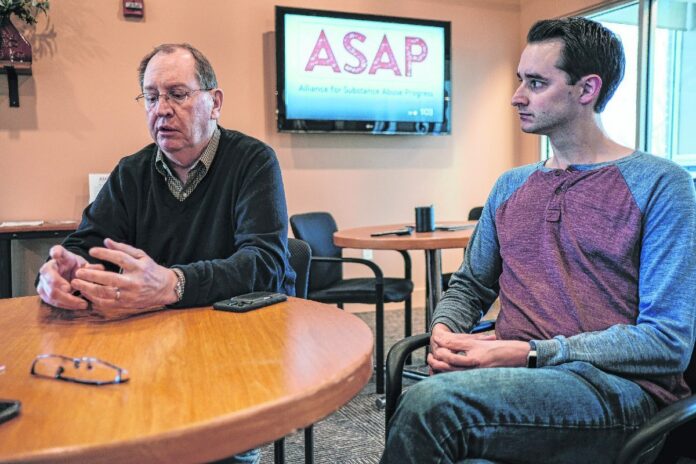
When Doug Leonard stepped down as CEO of Columbus Regional Hospital in 2007 to lead the Indiana Hospital and Health Association, some say he dodged a major calamity. Just one year later, massive flooding caused millions in damage to the hospital, which embarked on a massive renovation project to restore the facility.
But years later, Leonard found himself back in Columbus dealing with dangerous and large-scale problems — this time from the COVID-19 pandemic and its effect on the individuals in recovery in the community.
The virus emerged less than a year after retired Leonard, who had retired from the association, was named as Alliance for Substance Abuse Progress executive director. Launched in 2017, ASAP is a community-wide response to address substance use disorder, including the opioid crisis, in Bartholomew County.
“It brought the whole system to a crawl,” Leonard said of the pandemic’s effect on the organization. “When we had to close the HUB facility, it caused us to find alternative ways that we could still be available to people. We had a connection spot on our website for those who needed to reach us. We monitored that, and got back to people right away.”
But many recovering addicts do not have computers or smart phones capable of video conferencing, so that option wasn’t usually available, he said. In addition, treatment centers and recovery meetings had to close down.
The virus created a substantial set-back for people with a substance abuse disorder, resulting in an increase in addiction relapses, he said.
“Those people are probably the most vulnerable, because if they had a job, they probably lost it,” Leonard said. “If they had a home, they could have lost it. With the depression and anxiety, we saw a corresponding number of overdoses go up.”
Thirty Bartholomew County residents died of drug overdoses in 2020 — the highest number of overdose deaths since at least 2015, according to coroner’s office statistics.
But as Leonard prepares to be succeeded July 30 by Sherri Jewett, a former executive of several psychiatric and substance use hospitals, he said he believes ASAP has found its footing again even as the pandemic continues.
The entire staff of the Hub — which helps individuals navigate complex paths toward recovery — was back to work by mid-February after all employees received their vaccinations. The Hub’s resources include referrals to existing programs, securing financial assistance for recovery, and — if necessary — help obtain food, housing and transportation for the recovering addict.
Leonard says the number of people utilizing the Hub, located in the Doug Otto Center at 1531 13th St., is not yet back to pre-COVID levels, he said.
“The people we serve often don’t keep up with the news,” Leonard said. “It’s hard to reach them to let them know we are open. But we’re hoping they learn through word-of-mouth.”
The Hub has still managed to open 310 new cases and attract 29 active volunteers since its opening. While the volume of individuals utilizing the facility has not yet risen to pre-COVID levels, Leonard said he believes word-of-mouth will gradually increase usage.
Leonard said he is also pleased ASAP hired Ascension Recovery Services of Morgantown, West Virginia, to develop a tool kit that could serve as a step-by-step guide for anyone wishing to establish a sober living home.
Their personnel spent over a year talking to what Leonard calls “stakeholders” (landlords, churches, township trustees, homeless shelters, etc) to see what can be done to temporarily house those recovering from substance abuse disorder, so they aren’t forced to return to the same environment and individuals that led to their addiction, Leonard said.
As a result, the Columbus area now has 10 sobriety or recovery homes, including three managed by ASAP, he said. These facilities provide safe housing and supportive, as well as structured living conditions for people who have just been released from drug rehabilitation programs.
“There are a lot of different flavors, and clients get matched with what works for them,” Leonard said.
Despite their differences, sobriety home managers meet monthly to discuss solutions to common problems, while recovery meetings have resumed for those in recovery, Leonard said. In addition, ASAP has also found a degree of success in finding employers willing to hire sobriety home residents, he said.
While Leonard has frequently called the ASAP staff the best he has ever worked with, he is reluctant to take credit himself for advances made over the past few years.
“I was fortunate that all the preliminary planning had been done, and the community came up with a brilliant plan led by (former ASAP interim director) Jeff Jones,” Leonard said.
He recalled becoming very inspired by the planning before he retired from the state hospital association in June 2017.
“I actually shared the plan happening in Columbus with other hospitals,” Leonard said. “I said here’s a great model that is being developed that you can consider doing in your own community.”
Leonard compared taking over ASAP in 2019 with being given the keys to a new bus someone else built, and being asked to give it the first test drive.
When asked what has given him the most pride at ASAP during the last two years, Leonard replied with a one-word answer — collaboration.
“We don’t seek, nor do we take credit for anything we do,” Leonard said. “Our role is to help the system grow and thrive, and our eyes were wide open to partner with anyone (to provide substance abuse treatment).”
Leonard is handing over the organizational reins to Jewett just weeks before the city and county councils begin hearings for next year’s financial budget. But he isn’t worried about financial cuts because support for funding substance abuse recovery programs seems to remain high among local elected officials, he said.
“All feedback I’ve gotten is that the community is very happy ASAP exists, and they like how we are doing our work,” Leonard said. “This really is an extraordinary thing because I know communities all over the state are grappling with the same problem. But there is almost no community that has done anything like what Columbus has done.”
Although Leonard says he will be content returning to retirement on Aug. 1, he gave assurances that he will make himself available as an unpaid consultant to ASAP whenever the organization feel they could use his services.




